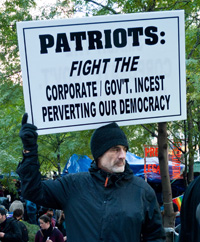By Susan M. Sipprelle
Englewood, NJ, USA

Susan M. Sipprelle
|
Last month, New York City’s Mayor Michael Bloomberg evicted the Occupy Wall Street protestors from Zuccotti Park. Now that many cities across the country have cracked down on the encampments in public spaces, what direction will the movement take?
Over the few weeks of its existence in Zuccotti Park, Occupy Wall Street was an amazing place to see citizens exercising their rights to assemble and speak freely. By mid-November the Siena Research Institute reported that two-thirds of voters were paying attention to the Occupy Wall Street movement. Voters, by a two-to-one margin, said the movement does not represent 99 percent of Americans, but 58 percent of voters believed that the protestors should be allowed to camp in parks overnight.
Now that the movement has been forced by authorities to disperse, can Occupy Wall Street regroup and redefine itself? Can the energy of the movement get harnessed to the old-fashioned ideal of making sure all Americans get a fair shake - my assessment of what the movement is about, despite its numerous voices and varied goals.
When I traveled in Ireland with my family a couple of summers ago, our tour guide pointed out Bono’s estate to us. The guide said that an Irishman would say, “I’d like to knock him off and live there myself.” He contrasted that attitude with what he believed the typical American would say: “I’ll have a place like that myself someday.”
His anecdote pointed to the belief in socioeconomic mobility that underlies the American Dream and its implicit assumption of fairness - that workers will receive a reasonable wage for their labor and that they will have opportunities to save, purchase homes, provide education for their children and achieve financial security, if not rock star wealth.
Faith in the American Dream is eroding, as income inequality widens in the United States and the number of unemployed remains stuck at approximately 14 million, a number we all know by now significantly underestimates the actual number of suffering Americans, many of whom are severely underemployed workers or discouraged jobseekers.
Ninety percent of Americans think it is a bad time to find a quality job, according to Gallup, which is the most pessimistic they have been in the past decade.
A recent CNN/ORC International poll finds that only 44 percent of Americans believe that things will be going well in the country a year from now, compared to 55 percent a year ago and 63 percent two years ago.
Most significantly, in 2011, only 47 percent of Americans believe their children will attain a higher standard of living than they themselves have achieved, which is a significant drop from two years ago, when 62 percent of Americans believed that their children would achieve a higher standard of living when adults than they themselves have reached, as reported by the Economic Mobility Project of the Pew Charitable Trust.
In general, Occupy Wall Street has been pegged as anti-business and contrasted against the Tea Party’s anti-government agenda, but based on the interviews that Over 50 and Out of Work conducted in Zuccotti Park, the dissatisfactions underlying Occupy Wall Street cannot be summed up and characterized so easily as simply anti-business.

From Occupy Wall Street
|
Participants in the movement are motivated by the feeling that they cannot get a fair shake any longer, despite their willingness to attend college and graduate, work at (or try to find decent-paying) jobs and serve in the U.S. military. They believe that the odds are increasingly stacked by both business and government against their abilities as individuals to shape their own futures.
Occupy Wall Street is an expression, born outside traditional politics, of the fading confidence in the tenet that an American can work hard, (mostly) control his or her destiny and achieve the American Dream.
Yaneer Bar-Yam, an American born physicist, systems scientist and founder of the New England Complex Systems Institute described Occupy Wall Street as “an expression of general concern for financial and economic well-being” that focuses on the problem of “undue influence” exerted by business on government that government has been unable or unwilling to withstand.
Critics of the amorphous Occupy Wall Street movement urge its participants to get involved in the political process, the Tea Party’s strategy, which may eventually be the route the movement takes. In the meantime, though, there are some good reasons that Occupy Wall Street has not barnstormed into politics as usual, which the movement regards as broken and corrupt, placing it in sync with mainstream public opinion on this issue: Only about 12 percent of Americans give Congress a favorable job approval rating.
Most movement participants are not in favor of the 2010 Citizens United Supreme Court ruling that gave corporations and unions the freedom to spend as much as they like in elections, further weakening the one living person/one vote principle. Last month, CNN reported that 78 percent of seats in the U.S. House of Representatives did not change parties even once over the past decade due to gerrymandering of election district boundaries drawn to favor incumbents and reduce the power of the individual voter.
Yearning is a powerful emotion, and President Obama won in 2008 on a mandate for “change” that has not materialized for most Americans, especially young Americans, who have seen their unemployment rates skyrocket to over 16 percent. Occupy Wall Street has, thus far, hitched itself to the unsatisfied desire of many Americans to regain some modicum of control over their own economic well-being and futures - a yearning with roots in our nation’s history and connections to today’s global uprisings, a yearning with legs that cannot be ignored or thwarted indefinitely.
Link:
www.overfiftyandoutofwork.com
Susan M. Sipprelle is a multimedia documentary maker, a journalist and a photographer. She graduated from the Columbia Graduate School of Journalism in 2008, and is the mother of five children.
OVER 50 AND OUT OF WORK is an ongoing multimedia project that documents the impact of the Great Recession on jobless Americans, 50 and older. Boomers, generally regarded as self-centered and indulgent, reveal unexpected depths of faith, perseverance and resilience through their life stories.

